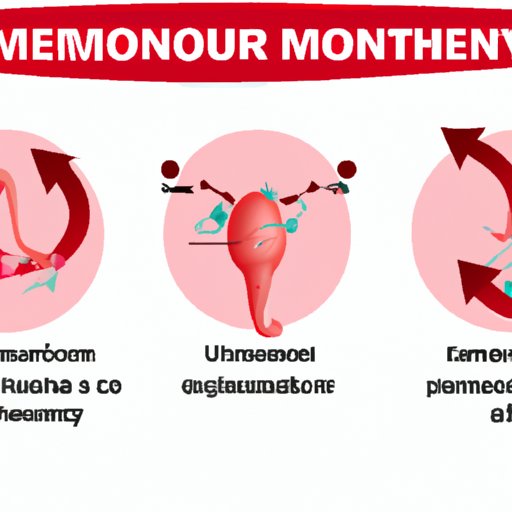
Introduction
Missing periods can be a confusing and alarming experience, especially for women who are trying to conceive. However, the absence of menstruation doesn’t necessarily mean you can’t get pregnant. In this article, we explore the concept of ovulation, the causes and symptoms of amenorrhea, the myths and facts surrounding pregnancy without periods, and the treatment options available for women struggling with absent periods.
Why missing your period for 2 years does not necessarily mean you can’t get pregnant
Many women believe that missing their period for two years or more means they are infertile. However, that’s not necessarily true. Ovulation, the process by which the ovary releases an egg, is the key to fertility, not menstruation.
Women can still ovulate without having regular menstrual cycles. This is because menstruation is the shedding of the uterine lining after ovulation has occurred. So, if ovulation doesn’t happen, there’s nothing to shed, and there will be no menstrual cycle.
Furthermore, there are cases of women who have become pregnant without having regular periods.
Understanding amenorrhea and its potential impact on fertility
Amenorrhea is a medical condition that refers to the absence of menstruation. There are two types of amenorrhea: primary and secondary. Primary amenorrhea occurs when a girl never begins to menstruate by the age of 16, while secondary amenorrhea is a condition where a woman stops having periods for more than six months, having had a previously regular cycle.
The causes of amenorrhea vary and can range from genetic disorders, extreme athletic training or weight loss, polycystic ovary syndrome (PCOS), thyroid dysfunction, and pituitary or hypothalamic disorders. The symptoms of amenorrhea include hot flashes, mood changes, vaginal dryness, and headaches.
Untreated amenorrhea can have a significant impact on fertility, making it difficult for women to conceive.
The myths and facts about getting pregnant without a period
There are several common misconceptions about pregnancy and menstruation
One of the biggest myths is that ovulation always happens on day 14 of a woman’s menstrual cycle. In reality, ovulation can occur at any time during the menstrual cycle.
Another myth is that having sex during menstruation cannot result in pregnancy. While the chances of getting pregnant are lower during menstruation, it is still possible. If a woman ovulates shortly after her period, she can conceive.
On the other hand, there are scientific facts that suggest pregnancy without menstruation is possible. Women with amenorrhea can still ovulate and become pregnant. The key is to identify when ovulation is happening to maximize your chances of conception.

The role of hormonal imbalances in the absence of menstruation and fertility
Several hormones regulate menstruation and fertility. Hormonal imbalances can disrupt this process, leading to absent periods and fertility challenges.
The hormones that play a role in menstruation include estrogen, progesterone, follicle-stimulating hormone (FSH), and luteinizing hormone (LH). In women with amenorrhea, any of these hormones may be out of balance, which can cause dysfunction in the ovaries and prevent ovulation.
Hormonal imbalances can also cause other health problems, such as thyroid dysfunction, which can further interfere with fertility.
Alternative methods of tracking ovulation for women with irregular periods
If you have irregular periods, tracking ovulation can be challenging. The traditional method of ovulation tracking involves calculating when ovulation is likely to occur based on past menstrual cycle lengths and other physical signs such as cervical mucus and basal body temperature.
Alternatively, modern methods such as ovulation predictor kits (OPKs) and fertility monitors can help women with irregular periods track ovulation with greater accuracy.
The importance of seeking medical advice and treatment for women struggling to conceive due to absent periods
If you are struggling with absent periods and infertility, seeking medical attention is crucial. Your doctor will perform a physical exam and may order tests to determine the underlying cause of your amenorrhea. Treatment options will depend on the underlying cause of your condition and may include hormonal therapy, surgery, or lifestyle changes, such as improved nutrition or weight management.
Medical treatment not only helps regulate menstruation but also improves fertility in many cases.
Hope for women with amenorrhea: success stories of women who have become pregnant despite not having a regular period
Despite the challenges associated with amenorrhea and infertility, there is hope for women struggling with these conditions. Many women have successfully conceived and given birth to healthy babies despite the absence of periods.
One such woman, Rachel Gurevich, writes about her experience with amenorrhea and the successful birth of her son on the Verywell Family website. Rachel’s story is just one example of the many women who have overcome infertility and become mothers.
Conclusion
Absent periods do not necessarily mean you cannot get pregnant. Understanding ovulation and seeking medical treatment for amenorrhea can help improve your chances of conception. If you are struggling with infertility, there is hope, and many women who have overcome similar struggles have become mothers. So, don’t lose hope and talk to your doctor about ways to support your fertility.





